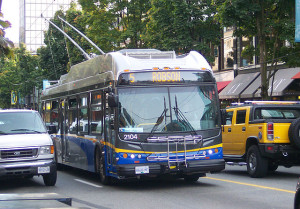Charlotte Personal Injury Attorney Matthew R. Arnold of Arnold & Smith, PLLC answers the question “What can you sue for in a personal injury case?”
A recent crash involving the new Charlotte trolley system illustrates an important but often misunderstood aspect of North Carolina personal injury law. Though many people assume that when you’ve been injured in an accident caused by someone else you can simply sue to receive compensation for your damages, regardless of whether you as the victim may be somewhat responsible for the accident. In North Carolina, the personal injury laws make it impossible for a victim to sue the person that caused the harm if the victim is found to be at fault in any way for the accident.
 A crash late last month in Charlotte involving the new Gold Line trolley left one man injured and his SUV crushed. According to news reports, the accident was likely caused by operator error, with the driver of the trolley failing to engage a switch that then led the trolley to roll down a hill into the back of an unsuspecting SUV.
A crash late last month in Charlotte involving the new Gold Line trolley left one man injured and his SUV crushed. According to news reports, the accident was likely caused by operator error, with the driver of the trolley failing to engage a switch that then led the trolley to roll down a hill into the back of an unsuspecting SUV.
Though the driver of the SUV appears to have done absolutely nothing wrong, with the trolley driver clearly at fault, the case makes for a good illustration of how North Carolina’s laws regarding fault could potentially lead to bizarre results. For instance, if the driver of the SUV in this recent case had not been stopped on the road and hit from behind out of nowhere, but had instead made a small mistake, like turning out in front of the trolley after rolling through a red light, this could potentially be enough to deny an injury claim.
Now let’s back up and explain why that is. North Carolina is one of only four states in the country that follows what’s known as a contributory negligence standard. This means that if a plaintiff in a personal injury case is found to be at all responsible for his or her harm, then the plaintiff is completely barred from recovering damages. This rule applies across a wide spectrum of personal injury cases, including products liability, premises liability and, in this case, a car accident.
Many states, including North Carolina’s neighboring states, follow what’s known as a comparative negligence standard. This can take many different forms, but generally says that if a plaintiff is less than 51 percent at fault for the accident, he or she can recover damages. In North Carolina, even a plaintiff found to be 1 percent at fault would be denied all damages against a defendant 99 percent at fault.
North Carolina’s law is incredibly stringent and effectively creates an all or nothing personal injury rule. As there is no apportionment of fault between parties, a plaintiff in North Carolina is prevented from recovering any damages if his mistake was a cause of an accident, even if the defendant’s actions were a much bigger cause.
Going back to our earlier hypothetical example, a driver who had turned in front of the runaway trolley when he or she wasn’t supposed to could be considered partially at fault for the accident. After all, if he or she hadn’t run the light, the accident would not have happened. In such a case, the victim would be denied all hope of recovery, despite the fact that the driver of the trolley was clearly at fault and that this person’s fault resulted in great harm to the victim. Common sense would indicate the victim should recover something for his harm. Sadly, common sense does not prevail under North Carolina’s contributory negligence standard.
If you or someone you know has any questions regarding potential personal injury claims, feel free to contact the experienced personal injury attorneys at Arnold & Smith, PLLC in Charlotte, North Carolina for a free consultation. Call toll free at (955) 370-2828 or click here for additional resources.
About the Author
 Matthew Arnold is a Managing Member of Arnold & Smith, PLLC, where he focuses on the areas of family law, divorce, child custody, child support, alimony and equitable distribution.
Matthew Arnold is a Managing Member of Arnold & Smith, PLLC, where he focuses on the areas of family law, divorce, child custody, child support, alimony and equitable distribution.
Mr. Arnold was raised in Charlotte, where he graduated from Providence Senior High School. He attended Belmont Abbey College, where he graduated cum laude, before attending law school at the University of North Carolina at Chapel Hill on a full academic scholarship.
A board-certified specialist in the practice of Family Law, Mr. Arnold is admitted to practice in all state courts in North Carolina, in the United States Federal Court for the Western District of North Carolina, in the North Carolina Court of Appeals and Supreme Court, and in the Fourth Circuit United States Court of Appeals in Richmond, Virginia.
In his free time, Mr. Arnold enjoys golfing and spending time with his wife and three children.
Sources:
http://www.wsoctv.com/news/news/local/cats-trolley-car-vehicle-collide-saturday/nm23G/
Image Credit:
“Vancouver trolley2101 050720” by w:user:Bobanny – User Bobanny on en.wp. Licensed under Copyrighted free use via Wikimedia Commons – https://commons.wikimedia.org/wiki/File:Vancouver_trolley2101_050720.jpg#/media/File:Vancouver_trolley2101_050720.jpg
See Our Related Video from our YouTube channel:
https://www.youtube.com/user/ArnoldSmithPLLC/videos
See Our Related Blog Posts:
 Charlotte Injury Lawyers Blog
Charlotte Injury Lawyers Blog

